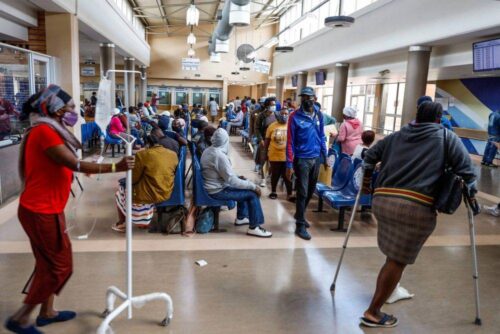
How Startups Are Trying to Address SA’s Healthcare Access Gap
Healthcare startups in South Africa are playing their part in helping to address the inequality in the country’s healthcare sector.
As the world’s most unequal country, South Africa’s lopsided wealth distribution has created a two-tiered healthcare system whose inequality mirrors that of apartheid, a system supposedly replaced by democracy 29 years ago. On the one hand, there is a mostly dilapidated public healthcare system servicing 85% of the population, and on the other hand is a world-class private healthcare system which ranks as the best on the continent.
To access efficient healthcare in private institutions, employed middle-class South Africans rely on medical aid schemes which subsidise around 90% of medical expenses. Despite this advantage, medical aid costs have surged in South Africa over the years, with coverage now costing an average of over R2,000 ($102). This has forced more people into the public healthcare system, which already services unemployed inhabitants who make up 33% of the country’s population. Additionally, it is characterised by understaffing, dilapidated infrastructure, and constant medical supplies shortages.
In June, South Africa’s national assembly passed the National Health Insurance (NHI) act which seeks to provide universal access to quality healthcare in the country. However, according to academics, until the NHI gets to a point where it can fulfil its mandate, technology innovators still have a large role to play in plugging the current gap.
“Healthcare and services promoting health as a resource in South Africa are ripe for systemic innovation that capitalises on resource scarcity,” writes Katusha de Villiers, senior project manager at Bertha Centre for Social Innovation and Entrepreneurship. “The work of social innovation provides an opportunity to develop transformative and systemic solutions that move the system as a whole closer to achieving health equity.”
To that end, there are numerous startups in the country, which are innovating for healthcare equity in the southern Africa nation.

Role of Startups in the Quest for Healthcare Equity
One of those startups is Welo Health, founded by Zanele Matome in 2020, which offers on-demand health services by connecting healthcare providers with patients via a model Matome refers to as “Uber for health.”
“Our core product comprises a B2B model which allows employees who are sick at home to use our app to match with a nurse,” Matome said. “The nurse can choose to accept the appointment and attend to the patient, after which they upload information on their dashboard which is shared with the patient and insurer.”
To accommodate unemployed and uninsured South Africans, the company had a B2C product that enabled delivery of medication to users. According to Matome, the service brought much-needed convenience and dignity to users of the public healthcare system, but as the company pivoted to a B2B model, it slowed its focus on the product. However, after realizing the need for such a service, especially in underprivileged communities, the company will be doubling down on the product after it raises its Series A round.
“For people who use public healthcare facilities, you have to wake up at 5 a.m. to queue at the clinic and have nurses shouting at you the whole day. There’s no dignity in the whole process,” she said. “So this product addresses that pain point by offering delivery services on behalf of users. It is already live for our B2B clients, but after we secure funding, we will also roll it out again to the B2C market.”
The company, which has so far raised $500,000 in venture funding as well as a $50,000 grant from the Bill & Melinda Gates Foundation-backed Investing in Innovation Africa (i3) initiative, claims that its B2B product offering brings in over R500,000 ($27,000) of monthly recurring revenue. As the company looks to relaunch the B2C offering amidst significant demand, they will be hoping to see how much its social impact will contribute to the company’s bottom line.
Pocket Couch is another healthtech startup addressing the need for equitable access to healthcare in South Africa. Founded in 2019 by Onkgopotse Khumalo, the company enables users to better manage their mental health. Via a mobile app, users can access therapists and mental health care experts, screening, and tracking tools as well as content specific to whatever kind of support the user might be looking for.
“The whole idea started with the intention of making mental health care as accessible as possible, especially in communities where accessibility is hard,” Khumalo said. “We address the issues of cost, convenience, and removal of stigma around mental health.”
Although Pocket Couch mainly works with enterprise clients to provide its services to their employees, it appreciates its role in catering for the rest of the population. To that end, it is engaged in various ways to ensure accessibility to mental health services in a country where 30% of the population has experienced a mental disorder in their lifetime.

